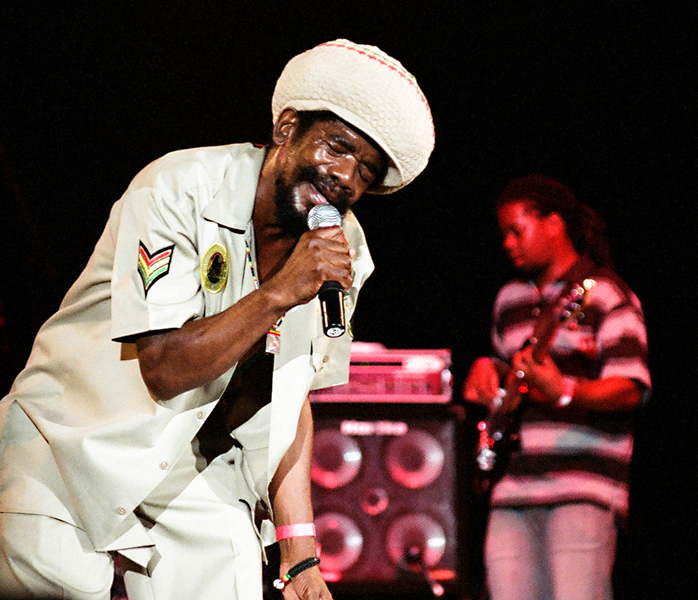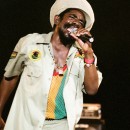 A Bajan Musical Experience Transcends from “Concert” to “Church”
A Bajan Musical Experience Transcends from “Concert” to “Church”
story by : admin photos by : Tamara Lee
Probably the most interesting part of Bajan culture is their relationship with music. (Oh, and their entrepreneurial bus system….but I will get to that in a minute.) On the wee 16km wide Carribean Island of Barbados, you are likely to come across the usual selection of island jams around the towns. This includes all branches on the “reggae” tree, from traditional reggae sounds to newer dance hall, soka music, and pop / r&b hits. Although all reggae originally stems from Jamaica, this musical genre is now being produced and shared around all of the Caribbean islands. Trinidad has bred some popular artists (such as Marlon Asher and Positive) and everyone in Barbados is quick to boast ownership to North American success, Rhiana, originally Bajan.
So, on this little Caribbean island, as to be expected, there is much Caribbean music to be had. If you are already in an island mind-space and an avid listener, then what is so special about reggae here? Well, simply put, it’s the way the Bajan people relate to their music. My North American (and European) roots have shaped music in to a listening experience. Traditionally, concerts were for watching and dancing was structured in to steps. Singing is for talented few and just in showers for many; karaoke usually requires much alcohol.
In Barbados, music is for anyone and any time. You can enjoy by observing or by partaking. Music is generally blaring aloud everywhere, and people of all ages will sing along if they like the song. It is not uncommon to find yourself next to a senior citizen in public who is passionately harmonizing to the latest reggae hit. On any radio station, the DJ will actively participate in the music, turning it down to sing over favorite parts or shout out crowd stimulators, mode a la dance hall party.
Then there is what I like to call the Reggae Bus. The charming Bajan bus system is entreprenurial and like none other that I’ve seen. Along the wee roads one to two dozen buses run the same route and dilligently compete to beat out the next guy on fares. Whether it’s school bus style or a tiny VW van-bus, they are usually driving mock ten around the twisting corners, and rarely make a complete stop to allow you to board. Good thing for the fifteen year old “conductor” who will hold you in and “seat” you safely to a bench seat. These seats could have been comfortable when the bus is at it’s twelve person capacity, except for the twenty other passengers that give the whole thing a clown car feel. It’s best to forget about it and focus on better days, when there were seat belts, rust free doors and no risk of losing your lunch around the next corner. But, thank goodness, there is one thing that really makes escapism easy and the experience bearable- the reggae.
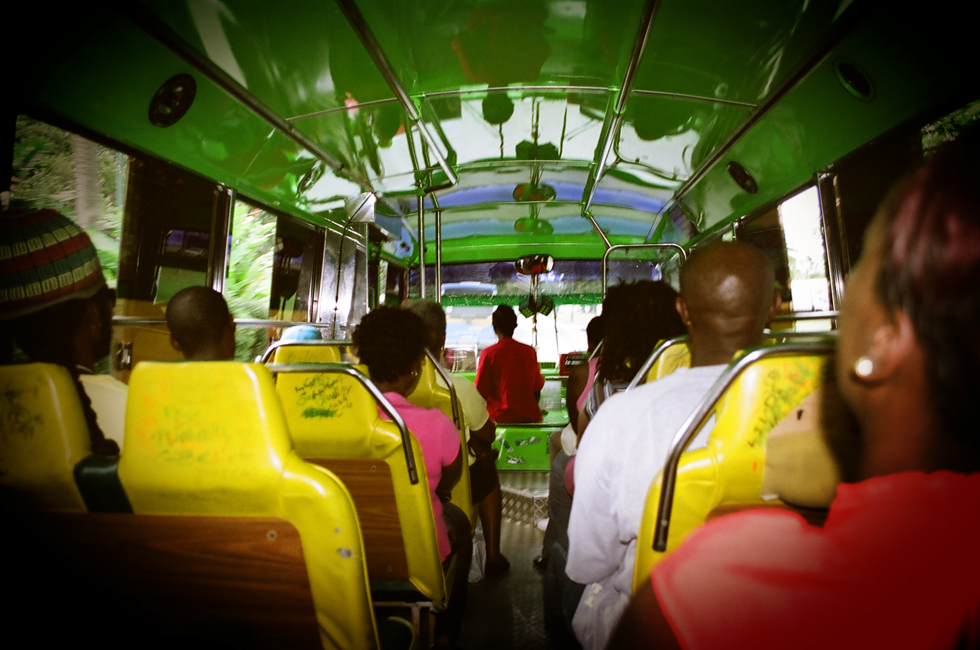 Each bus is a mobile musical dance party; goods which I might only get at home if I paid fifty bucks for a college pub crawl. On each ride the music is cranked full blast and pumped through an elaborate surround-sound party system. The decorum is often florescent lighting a la discotech, and the fanciest bus might include a disco ball or some bus-sized fuzzy dice.
Each bus is a mobile musical dance party; goods which I might only get at home if I paid fifty bucks for a college pub crawl. On each ride the music is cranked full blast and pumped through an elaborate surround-sound party system. The decorum is often florescent lighting a la discotech, and the fanciest bus might include a disco ball or some bus-sized fuzzy dice.
This party is not just for the kids either. Everyone aboard that bus, young or old ,will sing out uninhibited if they like the tune. With that kind of jovial vibe it becomes easy for all the estranged foreigners to forget we are aboard the death trap, while the happy little island jams just melt all of our troubles away.
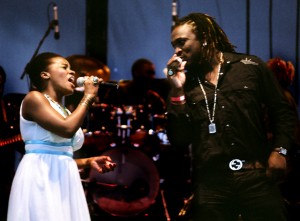 Aside from transportational escapism, there are other reasons that the Bajan culture has a strong relationship with their music. Reggae in its original and pure form is often closely tied into the Rastafari movement. Also originating in Jamaica, Rasta people follow a religion with the belief of “Jah” as God. Many also believe that Jesus Christ was the reincarnation of God, and that “Zion” (mother land of Africa) will be the return of paradise and heaven. They also refer to the sinful and oppressive ways of “Babylon”, which is the Western World. The Rasta movement’s most commonly known trait is their spiritual use of marijuana, and like many other religions, they preach love and respect for mankind.
Aside from transportational escapism, there are other reasons that the Bajan culture has a strong relationship with their music. Reggae in its original and pure form is often closely tied into the Rastafari movement. Also originating in Jamaica, Rasta people follow a religion with the belief of “Jah” as God. Many also believe that Jesus Christ was the reincarnation of God, and that “Zion” (mother land of Africa) will be the return of paradise and heaven. They also refer to the sinful and oppressive ways of “Babylon”, which is the Western World. The Rasta movement’s most commonly known trait is their spiritual use of marijuana, and like many other religions, they preach love and respect for mankind.
While in Barbados, I had the opportunity to experience these ideas during a festival concert called The Reggae Explosion. Unlike the standard concert atmosphere at home, these musicians sang about all of these spiritual beliefs with the passion of religious love. The audience was also very involved, singing emotionally and shouting to Jah 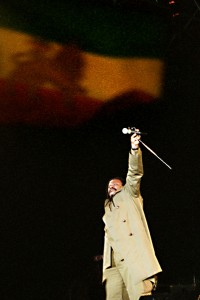 as the stadium took steeple form. During the musical prayer and in pure Rasta fashion, the audience also celebrated with copious amounts of Ganja, and there wasn’t a white eye in the crowd.
as the stadium took steeple form. During the musical prayer and in pure Rasta fashion, the audience also celebrated with copious amounts of Ganja, and there wasn’t a white eye in the crowd.
Despite the greenery, this was still church and the musicians were our preachers. Some on the bill are particularly known for the task, such as Luciano who is commonly reffered to as The Messenger. On the topic of reggae music, he has been quoted as saying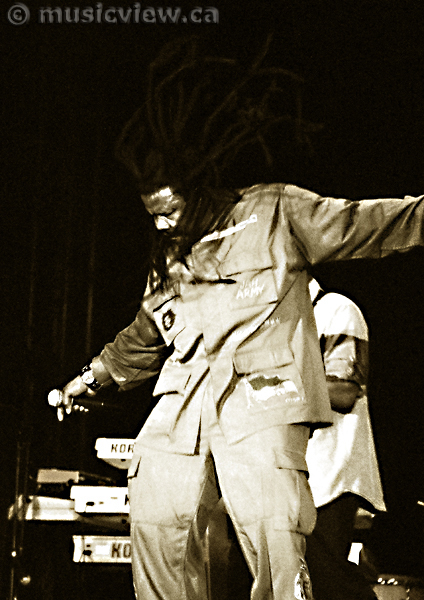
“It’s a rhythm set to a poor man’s cry. A pledge from singer to struggler that ‘better must come’.”
Other spirit speakers at the concert included influential Kymani Marley (son of Bob Marley), as well as Cocoa Tea, Etana and Anthony B.
Church infused concerts may seem out of the ordinary, but this religious and emotional relationship does make sense if we trace this music back to its roots. Reggae was born as a reactionary idea during a turbulent time. Impoverished and oppressed people in Jamaica used reggae to spread ideas, raise spirits and gain momentum. Music has been used in a similar way many times before; from tribal rythmic dances by Native and African cultures to cotton pickers and railway builders songs that carried them through their day. My own ancestors also used music spiritually to experience and communicate with God.
It’s hard to say what makes the modern music experience at home now so different. It could be the commercialism or the way we have come to worship our celebrities. It may be that our 1st world society is not dealing with the same hardships as other countries. Whatever it is, seeing the differences elsewhere helps to offer me a whole new perspective on things. Perhaps a little piece of that Rasta movement came back with me, or at least I can appreciate things in a new way. Thank you Barbados! (And thank you Bajan buses for sparing my life!)
